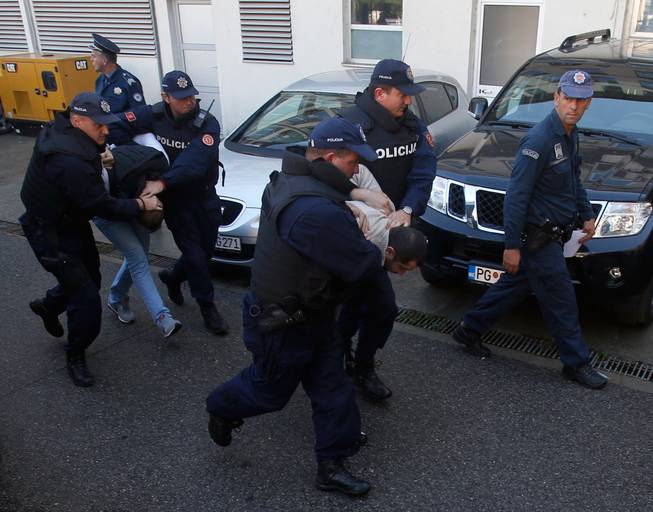
Darko Vojinovic / AP
Montenegrin police officers escort men for questioning Sunday, Oct. 16, 2016, in Podgorica, Montenegro. Rising tensions amid a crucial election led Montenegrin police to arrest 20 people who are suspected of planning armed attacks after the vote that could determine whether the small Balkan state continues on its Western course or turns back to traditional ally Russia.
Sunday, Oct. 16, 2016 | 11:54 a.m.
PODGORICA, Montenegro — Police in Montenegro have arrested 20 Serbs suspected of planning politically motivated armed attacks amid a parliamentary election Sunday that could determine whether the small Balkan state continues on its Western course or turns back to traditional ally Russia.
Prime Minister Milo Djukanovic faced the toughest challenge yet to his quarter-century rule and pre-election polls have predicted the closest race since Montenegro gained independence from neighboring Serbia a decade ago.
The parliamentary vote pitted Djukanovic's Democratic Party of Socialists against a cluster of pro-Russian and pro-Serbian opposition groups that staunchly oppose the government's pro-Western policies, especially its NATO bid.
Police Director Slavko Stojanovic said those arrested Saturday night came from Serbia and planned to collect automatic weapons to attack state institutions, police and possibly state officials after the vote.
Serbia's former special forces commander, Bratislav Dikic, who was removed from the post in 2013 because of his alleged criminal activities, was among those arrested.
Stojanovic said they were charged of "forming a criminal organization and terrorism." He said one Serbian is still on the run.
The prosecutor's office said the group planned to attack people who gather in front of the parliament when the vote results are proclaimed, then storm the building in the capital and declare the victory "of certain parties" in the election. The statement said they also planned to arrest Djukanovic.
Police vans were seen bringing in the handcuffed suspects to the prosecutor's office in Podgorica, the capital.
There have been fears that violence could erupt on the streets of Podgorica between opposition and government supporters after the results of Sunday's vote are announced. The government also said hackers have attacked several web sites, including that of the ruling party.
Montenegro's interior minister has warned people to stay indoors instead of celebrating in the streets after election results are announced. Police vehicles were seen on the outskirts of the capital.
Serbian Prime Minister Aleksandar Vucic, meanwhile, hinted that the arrests might have been staged by the government.
"It's a strange day on which all this is happening, that is all I will say," Vucic said.
One hour before the polls closed, turnout was about 71 percent, or around 5 percent more than during the last parliamentary vote, said independent monitoring group the Center for Democratic Transition.
The scenic country of 650,000 people, squeezed between the Adriatic Sea and towering mountains, is deeply divided among those who favor and those who oppose Western integration. The outcome of Sunday's vote could jeopardize NATO and European Union enlargement in southeastern Europe and could prove decisive in the Kremlin's attempts to regain influence in the strategic Balkans region.
Before the vote, Djukanovic said the ballot for the 81-seat parliament will decide whether Montenegro continues on a Western course or becomes "a Russian colony." On Sunday, Djukanovic said he expects to win and hold talks on a new coalition government.
"My expectation is that after this election Montenegro will steadily and dynamically move toward its European and Euro-Atlantic goals," he said.
Predominantly Orthodox Christian like Russia, Montenegro was Moscow's historical ally. But after splitting with Serbia in a 2006 referendum, Montenegro took a strong turn toward Western integrations.
Russia strongly opposes the expansion of NATO in European ex-communist countries it considers part of its "strategic interests." The West is wary of Russian influence in the still-volatile region, which was engulfed in bloody civil wars in the 1990s.
Opposition leaders have accused Djukanovic of corruption, nepotism and economic mismanagement and say he is trying to scare voters by suggesting that chaos will prevail if he loses.
"The only chaos will be within Djukanovic's cabinet," opposition Democratic Front leader Andrija Mandic said after he voted Sunday.
"I have no doubt that the opposition will show its strength and that the Democratic Front will become future framework of the Montenegro government," he added. "Today is the last day of Djukanovic's 27-year rule."
Associated Press writer Jovana Gec contributed from Belgrade, Serbia.

Join the Discussion:
Check this out for a full explanation of our conversion to the LiveFyre commenting system and instructions on how to sign up for an account.
Full comments policy